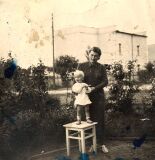back...There are mothers left and their plight is true heroism!

World War II mothers wanted to protect their offspring at all costs, often giving their lives for their children. These are the mothers who searched every day for the slightest trace of their children taken away by the occupying forces, never losing hope that they would soon be cuddled again. The 26th of May is Mother's Day in Poland and we wish to pay tribute to heroic mothers. One of them was Teresa Skibińska, mother of Wojciech and Jerzy Skibiński, former prisoners of the German concentration camp for Polish children on Przemysłowa Street in Łódź.
Teresa Skibińska was born on the 5th of April 1913. As early as at the age of 19, she married a young veterinary surgeon, Czesław Skibiński. They settled in a small town called Mosina, near Poznań. They formed a happy family. Soon children were born: Wiesia, Jurek, Wojtuś and Szczęsny. They built their dream house. Despite the German occupation, they led a quiet life. Czesław worked as a veterinary surgeon, Teresa devoted herself to bringing up a bunch of children. The end of the family’s hapiness came in September 1943 with Sachen Moschin, the Mosina Affair. The Germans accused the inhabitants of Mosina of acting to the detriment of the Third Reich.
On 9 September 1943, the adults were arrested. Their children were taken in the morning, on the 10th of September. The documents referred to them as ‘Kinder polnischen Terroristen’ (‘children of Polish terrorists’). First Czesław was taken away, then Teresa was arrested. Before she left, she turned to Wiesia, who was only ten years old, and told her to protect her brothers at all costs and not to let them be separated and to never forget their names. The parents were sent to camps in Poznań's Fort VII and Żabikowo. Czesław was then taken to Bergen Belsen, where he died. Teresa was taken from Żabikowo to Auschwitz. She was registered under number 67447. There she became seriously ill with typhoid fever. With the help of a fellow inmate who smuggled clean water for her, she managed to survive. Years later, she recalled that she was motivated to live by the thought of her children. She took solace in the letters she sent to the rest of her family in Mosina. From them she learned that her children were alive and in a camp in Łódź. In her letters, Teresa asked the children to remember each other and to pray. Despite her dire situation, she tried to keep her children's spirits up. She also found solace in looking after children at Auschwitz. She hoped that someone would also give her children a bit of maternal love, just as she gave it to the camp orphans. Unfortunately, her children in the camp in Łódź met only hunger, fear and hard work. At the end of 1944, Teresa Skibińska was sent to Ravensbrϋck camp. There she met Marysia Wisniewska, a prisoner from Przemysłowa Street. There was no end to the questions about her children. By this time, only Wiesia was in Łódź. Jurek and Wojtuś, together with the other youngest prisoners from Przemysłowa, were taken to the camp in Potulice in July 1944.
In April 1945, the Ravensbrϋck camp was evacuated. The women walked north in a murderous march. Teresa and three other female prisoners escaped, hiding in a roadside ditch and then in the forest. There they met fugitives from another camp. Together, they managed to make their way to Kostrzyn upon Odra. The hard homecoming stage began. She mainly got to Piła on foot, sometimes using a horse-drawn cart. From there, she took the train to Poznań. When she stood on the doorstep of her aunt's house, she bore no resemblance to the formerly elegant lady. The children were already at home by then. Luckily, thanks to the efforts of the aunt, who was the children's grandmother's sister, through the Polish Red Cross, Jurek and Wojtek were found. They were placed with foster families in Toruń. Wiesia returned alone. Little Szczęsny was found in a children's home in Ostrów Wielkopolski. None of the children recognized their mother. Teresa was emaciated, in dirty camp clothes with a military sack on her back. She suffered from aphonia. Out of the 163 women arrested in Mosina in 1943, only 23 survived, including Teresa Skibińska. The woman was slow to recover. She took up a job as a clerk. The Skibiński siblings were among the few survivors of the nightmare of the Przemysłowa camp to gain higher education and lead normal lives. Wiesia followed in her father's footsteps and became a vet. Jurek graduated in biology, Wojtek graduated in medicine and Szczęsny became an art historian. When he was asked about how this was achieved, Wojciech replied: Mum told us to just study. At the same time, she tried to ensure that the traumatic experience did not affect the children's lives.
Teresa Skibińska died on 25 October 1996 surrounded by those for whom she had dedicated her entire life.
During a meeting with young people at the Museum of Polish Children – Victims of Totalitarianism, Mr Wojciech Skibiński said: There are mothers left and their plight is true heroism!
The text is based on a meeting with Mr Wojciech Skibiński, which took place on the 26th of April 2024 at the Museum of Polish Children – Victims of Totalitarianism.
Photos from the private collection of Wojciech Skibiński.



